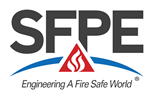Abstract
The parallel computation of FDS multi-mesh scenarios is closely linked to the efficient solution of the underlying pressure equation The default FDS pressure solver is essentially based on the use of local discretizations for the individual sub-meshes of the computational domain Thereby the global pressure solution is composed of respective local solutions which are obtained from the mesh-wise execution of highly optimized Fast Fourier Transformations(FFT) in each time step Due to the lack of a global discretization and the restriction of FFT to structured grids, this approach can cause the normal components of velocity to differ at adjacent mesh interfaces and to penetrate into immersed obstructions A possible remedy for the reduction of these velocity errors is to solve the pressure equation multiple times within each individual time step Although this pressure iteration works extremely well for a wide variety of cases, it can lead to considerable effort in special situations.
As an alternative approach the solver package Scalable Recursive Clustering(SCARC) was developed, using iterative solution strategies based on Krylov and Multigrid techniques in combination with various Schwarz preconditioners Since SCARC fundamentally relies on a global discretization, there are no more errors related to mesh interfaces Furthermore, internal obstructions can be addressed through both a structured and an unstructured discretization To prevent penetration into internal obstructions, an additional pressure iteration for velocity correction may also be required for the structured variant, but on the other hand it still allows the use of the optimized local FFT-solvers In contrast, the unstructured variant offers the correct treatment of internal obstructions without the need for auxiliary corrections, but the local FFT’s can no longer be applied and are replaced by optimized local LU-decompositions which however turn out to be less efficient than the local FFT’s.
This article gives a basic overview of the underlying concepts and the current state of development accompanied by some illustrative comparisons of the different variants with each other and with the default pressure solver.
Presentation
Resources
| Paper | Presentation | ||
|---|---|---|---|
| HTML | HTML | ||
| Resources Archive File (.zip) | |||


